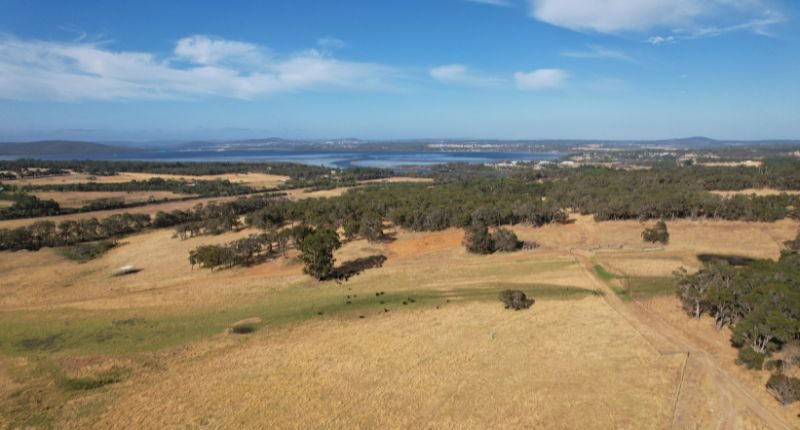- Property was sold through LAWD
- The property is being used as an Angus breeding operation by the new owners
- Tasmania and WA bucked the trend for lower farmer confidence in the latest quarter
The 227-hectare Candyup Hill Farm has been sold for $7.55 million or $38,325 per effective hectare.
Suited to both cattle and hay production, the property is located in Kalgan, 19 kilometres north-west of Albany and is already being used as an Angus breeding operation by the new owners, Wayne and Mandy Tapscott.
LAWD Director, Simon Wilkson, congratulated the Tapscotts on securing the high-grade asset which offers a productive balance of land classes and secure water resources, supported by reliable rainfall and proximity to the city centre of Albany.
“Candyup provides a significant livestock opportunity and is both highly-productive and picturesque — ideal for the Tapscotts as they expand their cattle enterprise in the region,” Wilkinson said.
“The range of soil types across the property are described as being duplex deep sandy gravels, duplex clay loam with some shallow gravels, while the permanent creek running through the property adds to the beautiful views of the property, and is predominantly covered with Marri and Jarrah trees.”
Water security was a key determinant for Mr Tapscott in the family’s decision to purchase the holding.
“The favourable winter dominant rainfall conditions and access to water made Candyup Hill Farm highly desirable as we expand our Angus cattle operation,” Tapscott said.
“The river running through the property will provide year-round water, while it also benefits from an average annual rainfall of 924 millimetres — removing the likelihood of needing to feed cattle.
“The location and ease of access to schools and town amenities, and our existing home, was also an enormous attraction.”
The Great Southern region is a significant contributor to Western Australia’s Gross Regional Product (GRP), accounting for 13% of overall agriculture output. The predominant agricultural industries include cropping, livestock and wool, with horticulture and viticulture also important contributors to the sector.
Farmer confidence falls across most of the nation
According to the latest Rabobank Rural Confidence Survey, sentiment among Australian farmers has dropped to its lowest level in more than four years in the latest quarter.
The number of farmers expecting the agricultural economy to improve over the coming 12 months dipped to 11% in the first quarter of 2023, compared to 15% in December 2022.
Rabobank’s survey also found that the number of farmers expecting business conditions to stay the same remained at around half (51%, up from 50%), but more are anticipating conditions to worsen (36%, up from 31%).
The survey found that the dip in confidence was driven largely by falling commodity prices and rising interest rates; a growing number were also concerned about a return to dry conditions.
Rabobank Australia CEO Peter Knoblanche said the latest survey reflects the
combination of commodity prices, global economic challenges and high production
costs facing farm businesses.
“Despite having their resilience tested throughout 2022, most Australian farmers
ended last year on a high, buoyed by seasonal conditions and high commodity prices
which saw our industry break farm production value records for the third year in a
row,” he said.
“However, as we see the heat come off many commodities – albeit down from
significant highs – farmers recognise conditions will start to return to more ‘normal’
levels.
“This survey captures their realistic expectations that commodity prices will likely not
return to the highs this year that we saw in the previous 12 months.
“Although there’s relief with some input prices easing, the anticipation of further
interest rates hikes will continue to place pressure on farm budgets.”
WA and Tasmania buck the trend
The only two states to see improved numbers were Western Australia and Tasmania.
In the West, the survey found 13% of the state’s farmers are expecting conditions in the agricultural economy to improve in the coming 12 months (up from 9% last quarter) with 53% expecting the current economic conditions to be maintained. The results also found fewer WA farmers anticipate business conditions to worsen, now 34% down from 38%.
Almost one in five (19%) of Tasmanian farmers had a rosier view of the next 12 months, up from 12% in the previous quarter. The number of farmers worried about the future reduced from 27% to 18%, with 61 having a stable outlook for the year ahead.
For full details of the survey, please head to the Rabobank website.
Edit: The article was previously published with the title: “West Australian farm sold for $7.5M as farmer confidence slumps across most of Australia”. This has now been updated to more accurately reflect the article.








